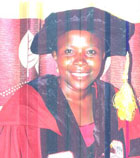International Journal of Philosophy and Theology, 1(1), pp. 28-33.
Abstract
Feminist leadership is very important in theological education as it would seek to deconstruct stereotypical assumptions about women and gender in Christian theological traditions. Unfortunately, most of the theological schools in Nigeria do not have feminist as leaders. Five reasons why feminist leadership are needed in theological schools have been identified as, the bible teaching that women brought sin and death to the world, servant hood notion of women, scandal of particularity, male domination of ministries and theological methods and process that are full of stereotypes. All this does not provide women a unique opportunity to discover and develop their potential in the church and society. Also, women’s relevance and contributions can be hampered if not allowed to put in their optimum. To avoid this, the researcher suggests that theological education should not discriminate against any gender, but should work to bring about gender justice by involving the feminist leaders in theological education in Nigeria. It is hoped that by pursuing these steps, theological education in Nigeria would be preparing the way to sustainable development of the mission of Christ on earth.
Full Text: PDF
Olusola, Ibiyinka Adesanya. (2013). Exploring the Relevance of Feminist Leadership in Theological Education of Nigerian. International Journal of Philosophy and Theology, 1(1), pp. 28-33.
1. Tray Barton, “Feminist Leadership: Building Nurturing Academic Communities”, Online Journal, Vol. 21, fall, 2006.
2. Dawn Ontario, http:// dawn. thot. net/feminist html. The feminist principle of leadership, accessed October, 2008.
3. Flora Carter, “Leadership Growth and Spiritin Quest”, A feminist Quaterly, 11 (4), 60-66.
4. Admiral, Section 8, “Management and Leadership”, feminist leadership available at http://www. Zenska-mresa.hrr/prirucnik. Len://ennnnnnnnnn-read.
5. Srilatha Batliwala, “Feminist leadership for social transformation”. This publication was commissioned by CREA as a resource for meeting, Building feminist leadership-Looking Back, Looking Forward” held from 12-14 Nov. 2008, Cape Town, South Africa, p.29.
6. Letty M. Russel and J. Shannon Clarkson (ed), “Theological Education” in Dictionary of feminist Theologies, Westminister John knox Press, 1996, pp.282-283
7. Feminist leaders in this category are many but two of them will be mentioned here. Elisabeth Schussler Florenza who encourages readers of scriptures to look for the presence of the women in the margins and around the edges of the text. Judith Plaskow, “ Standing Again at Sinai”, calls for a reconceptualization of notions of God , Torah and Israel that are inclusive of women.
8. Elizabeth Cady Stanton, Introduction to the Woman’s Bible” in Susan M. Shaw and Janet Lee (eds), Women’s Voices, feminist visions, New York, McGraw Hill, 2001, p.495.
9. Mary Daly, Church and the Second Sex, pp.46-47, if Ruether Liberation is Christianity Misogynist,pp. 95-113.
10. G. Kittel in Letty M. Russell, Human Liberation in a Feminist Perspective- A Theology, Philadelphia, The Westminister Press, 1974,pp.136-138.
11. ibid.
12. Swidler, “Jesus was a feminist”, Catholic World, 1971, p. 179.
13. ibid.
14. Letty M. Russel, Human Liberation in a feminist perspectives.
15. Isabel Apawo Phiri, Major challenges for African Women Theologians in Theological Education, (1989-2008) p.10
16. Those who have this objective are the Circle of Concerned African Women Theologians. The missionary of the Circle is to undertake research writing and publishing on African issues from Women’s perspective. The vision of the Circle is to empower African women to contribute their critical thinking and analysis to advance current knowledge.
17. Isabel Apawo Phiri p.12
18. A Loades, Feminist Theology in the section of a new direction in Christian studies, A reader; London, 1994.

Adesanya Ibiyinka Olusola is a Doctor of Sociology of Religion at Ekiti State University, Ado- Ekiti, Nigeria. Her career spans both Sociology of Religion and Feminist Studies. At the University of Ado- Ekiti, Ado- Ekiti, she concurrently earned an M.A in Comparative Religion and received a Post Graduate Diploma in Education in 2004. She lectured in Ondo State College of Education (now Ekiti State College of Education) between 1997 to January 2001. From 2001 to date, she lectures at Ekiti State University, Ado- Ekiti. She is currently lecturer 1 in the Department of Religious Studies, Ekiti State University, Ado- Ekiti, Nigeria. She has published articles in reputable journals and presented academic papers at various conferences among which are ,21st Annual Conference of National Association for the Study of Religion (NASR) held at University of Ado-Ekiti, Ado-Ekiti, Ekiti State, October 2000 ,4th International Conference of African Association for the Study of Religion (AASR), held at Obafemi Awolowo University, Ile-Ife, in January 2010,annual Conference of the Department of Religious Studies, University of Ibadan, Nigeria held at the University of Ibadan, Ibadan in February 2011,annual Conference, Circle of Concerned African Women Theologians, held at Talitha Qumi Centre, Trinity Theological College, Legon Ghana,NABIS Western Conference Held at the University of Ibadan from March 5th-9th, 2012 in honor of late Dr D.O Akintunde.She is a member of some professionals’ bodies like, Nigerian Association for the Study of Religions (NASR), Nigerian Association for Biblical Studies (NABIS) African Association for the study of Religion, Circle of Concerned African Women Theologians (CIRCLE).She is currently the President Good Women Association of the Redeemed Christian Church of God, Key of David Parish.
Browse Journals
Journal Policies
Information
Useful Links
- Call for Papers
- Submit Your Paper
- Publish in Your Native Language
- Subscribe the Journal
- Frequently Asked Questions
- Contact the Executive Editor
- Recommend this Journal to Librarian
- View the Current Issue
- View the Previous Issues
- Recommend this Journal to Friends
- Recommend a Special Issue
- Comment on the Journal
- Publish the Conference Proceedings
Latest Activities
Resources
Visiting Status
| 18 | |
| |
1411 |
| |
10804 |
| |
12976 |
| 1262966 | |
| 15 |
 The Brooklyn Research and Publishing Institute
The Brooklyn Research and Publishing Institute